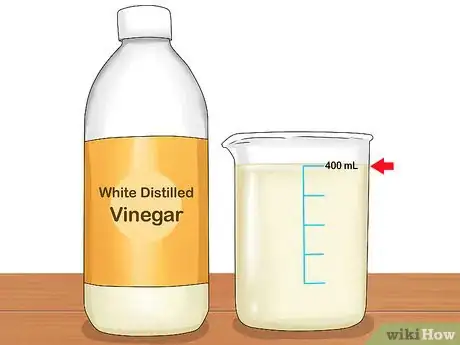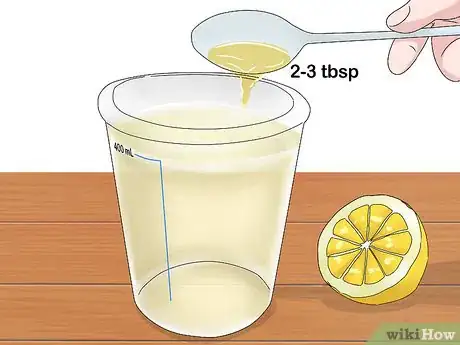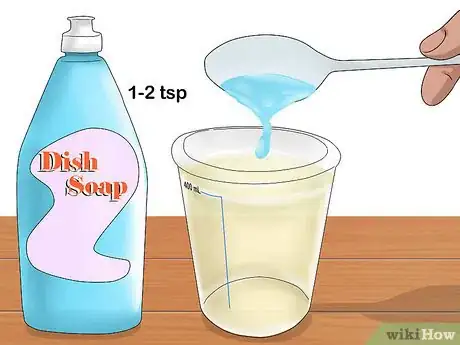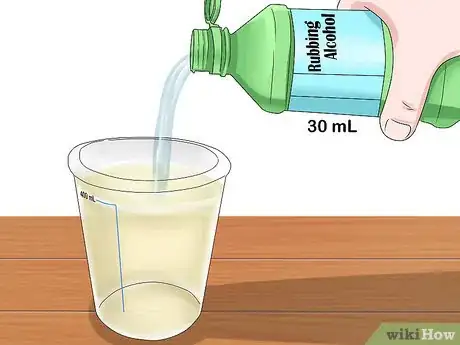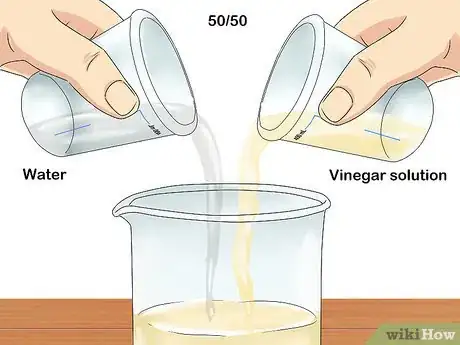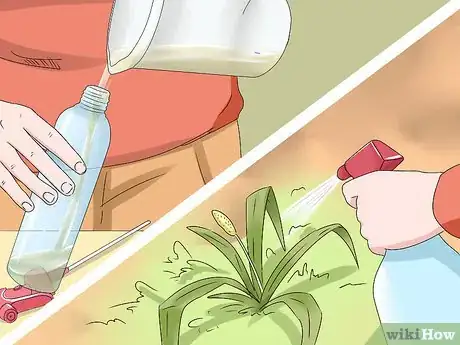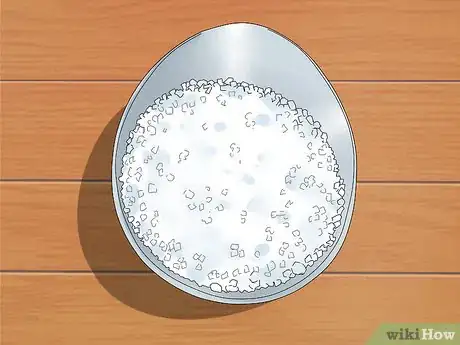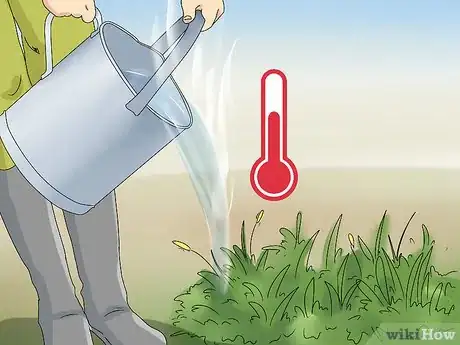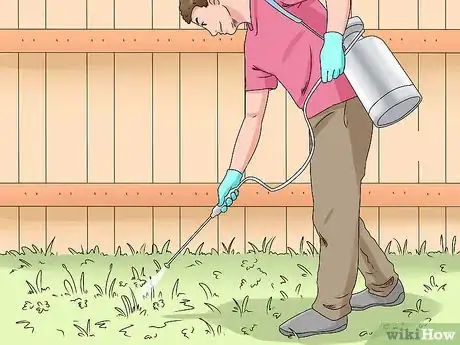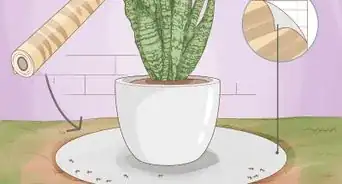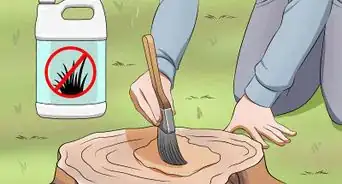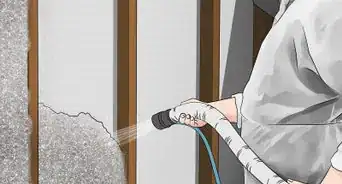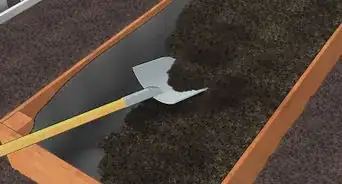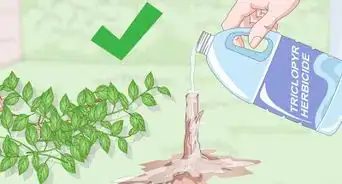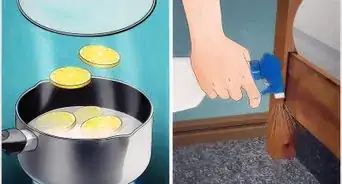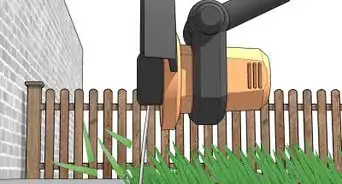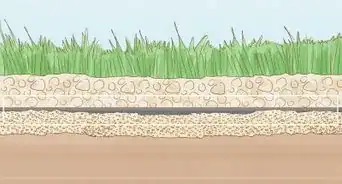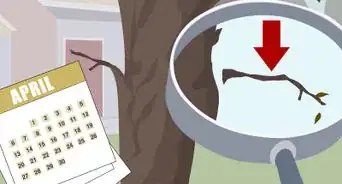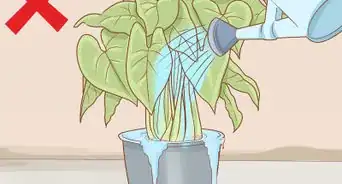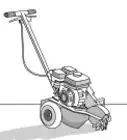This article was co-authored by Lauren Kurtz and by wikiHow staff writer, Amber Crain. Lauren Kurtz is a Naturalist and Horticultural Specialist. Lauren has worked for Aurora, Colorado managing the Water-Wise Garden at Aurora Municipal Center for the Water Conservation Department. She earned a BA in Environmental and Sustainability Studies from Western Michigan University in 2014.
wikiHow marks an article as reader-approved once it receives enough positive feedback. In this case, 93% of readers who voted found the article helpful, earning it our reader-approved status.
This article has been viewed 396,937 times.
Chemical weed killers are toxic to the environment and pose a risk to bees, other beneficial insects, wildlife, and even your pets and children if they play in the area you treat. As an alternative, you can make your own natural weed killer from common household products. Try various combinations of ingredients to find the weed killers that work best for you.
Steps
Creating a Natural Vinegar Spray
-
1Start with 2 c (400 mL) of white distilled vinegar. Vinegar contains acetic acid, which effectively kills weeds. Keep in mind that vinegar is non-selective and will kill any living plant it touches, not just weeds. White vinegar can be used alone, or you can add additional ingredients to the vinegar to make an even stronger solution.[1]
- Avoid using vinegar on or near your lawn, since it will kill the grass.
- Vinegar will raise the acidity of your soil. Before planting, test the pH of your soil and adjust it accordingly, if needed.
- Use horticultural vinegar with 20% acetic acid for increased effectiveness between pavers or on patios. The extra acidity will affect the pH balance of your soil and other plants.
-
2Add 2 to 3 tbsp (29 to 44 mL) of lemon juice concentrate, if desired. Lemon juice contains high levels of citric acid and can be effective when used with the white vinegar. If you want to try it, simply mix the lemon juice in with your 2 c (400 mL) of white distilled vinegar.[2]Advertisement
-
3Add 1 to 2 tsp (7 to 14 mL) of dish soap to kill particular plants. Dish soap can be a helpful addition to vinegar when you're dealing with weeds that have a waxy coating or a “hairy” surface, like dandelion and crabgrass. The fuzzy exterior blocks the absorption of vinegar, but dish soap will penetrate the outer protective layer of the plant and help the mixture stick to the leaves.[3]
- You can use dish soap or dishwasher detergent in liquid or powder form.
- Dish soap can be used in conjunction with a lemon-vinegar mixture, but a soap and vinegar solution will be very effective.
-
4Mix 1 fl oz (30 mL) of rubbing alcohol into white vinegar. Isopropyl alcohol can be very effective when mixed with white vinegar or even when used alone. You can also use cheap gin to achieve similar results. Simply add the alcohol of your choice to the white vinegar and stir it thoroughly.
- You can use alcohol, vinegar, and lemon juice together in one mixture, but a solution that strong may cause soil damage.
-
5Dilute the vinegar solution 1:1 with water. You can use the full-strength solution if your weed problem is severe, but this is typically too strong. A 50/50 mix diluted with water will be very effective on weeds without traumatizing the area where it's used.
- Full strength solutions may penetrate the soil and kill the roots of plants other than weeds. They can also disturb crucial microorganisms in the soil.[4]
-
6Pour the solution into a spray bottle and apply it to your weeds. Use a funnel to transfer the solution to a spray bottle, then replace the nozzle tightly. Apply the solution to the weeds and monitor the results for 24 hours. If needed, you can apply more solution, but you probably won't need to.
- Set the nozzle to "stream" rather than "spray" if the weeds are growing close to plants that you don't want to kill.
- Don't forget -- weed killer does not discriminate. It will kill any plant it comes in contact with, so use it carefully!
Killing Weeds with Other Household Products
-
1Use rock salt or table salt as a weed killer. Try this method only if you want to kill weeds in an area where you do not plan to grow anything for several years -- perhaps around paving stones and in pavement cracks. Salt kills the weeds by dehydrating them and absorbs into the ground, preventing all plant growth.[5] You can apply salt in one of two ways:
- Dissolve 1/2 c (120 mL) salt into enough warm or hot water to fill your spray bottle.
- Apply the salt dry. Simply sprinkle the salt on the weeds you want to kill. This works particularly well on garden paths and along lawn edgings.[6]
-
2Kill the weeds with boiling water. Dump a large pot of boiling water on your weeds if there are no other plants close by. Since boiling water kills the weeds by literally burning them, don't use it around your other plants. Boiling water can be very effective, especially on young weeds, and results are typically immediate.[7]
- You might have to repeat this several times over multiple days to sufficiently kill all the weeds.
- Add 1 tbsp (15 g) of table salt to the boiling water to make an even stronger solution.
-
3Spray a mixture of borax and water on the weeds. Mix 10 ounces (280 g) of borax and 2.5 gallons (9.5 L) of water together thoroughly. Use a garden sprayer to apply the solution to the weeds. Be careful not to saturate the soil as it could damage plants you want to keep.[8]
- Wear gloves and glasses while you handle the solution, since it may cause skin irritation.
- Never use this solution to control weeds in a vegetable or flower garden; it will damage veggies and flowers.
Expert Q&A
Did you know you can get expert answers for this article?
Unlock expert answers by supporting wikiHow
-
QuestionIf I dilute the vinegar with water, will it kill my grass?
 Lauren KurtzLauren Kurtz is a Naturalist and Horticultural Specialist. Lauren has worked for Aurora, Colorado managing the Water-Wise Garden at Aurora Municipal Center for the Water Conservation Department. She earned a BA in Environmental and Sustainability Studies from Western Michigan University in 2014.
Lauren KurtzLauren Kurtz is a Naturalist and Horticultural Specialist. Lauren has worked for Aurora, Colorado managing the Water-Wise Garden at Aurora Municipal Center for the Water Conservation Department. She earned a BA in Environmental and Sustainability Studies from Western Michigan University in 2014.
Professional Gardener
-
QuestionWhat is the ratio of salt to water for weed killer?
 Lauren KurtzLauren Kurtz is a Naturalist and Horticultural Specialist. Lauren has worked for Aurora, Colorado managing the Water-Wise Garden at Aurora Municipal Center for the Water Conservation Department. She earned a BA in Environmental and Sustainability Studies from Western Michigan University in 2014.
Lauren KurtzLauren Kurtz is a Naturalist and Horticultural Specialist. Lauren has worked for Aurora, Colorado managing the Water-Wise Garden at Aurora Municipal Center for the Water Conservation Department. She earned a BA in Environmental and Sustainability Studies from Western Michigan University in 2014.
Professional Gardener
-
QuestionWould it help if I add citric acid to the weed killer?
 Community AnswerYes, it would.
Community AnswerYes, it would.
Things You'll Need
Natural Vinegar Spray
- Distilled white vinegar
- Spray bottle
- Lemon juice
- Rubbing alcohol
- Dish soap
- Spoon
- Water
Killing Weeds with Other Household Products
- Rock salt
- Measuring cup
- Boiling water
- Salt
- Borax
- Water
- Plastic gloves
- Garden sprayer
References
- ↑ http://www.garden-counselor-lawn-care.com/vinegar-weed-killer.html
- ↑ https://thefrugalgirls.com/2010/10/frugal-tip-homemade-weed-killer.html
- ↑ http://www.garden-counselor-lawn-care.com/vinegar-weed-killer.html
- ↑ http://www.garden-counselor-lawn-care.com/vinegar-weed-killer.html
- ↑ http://www.garden-counselor-lawn-care.com/home-made-weed-killer.html
- ↑ https://www.goodhousekeeping.com/home/gardening/advice/g777/homemade-weed-killers/?slide=11
- ↑ https://www.goodhousekeeping.com/home/gardening/advice/g777/homemade-weed-killers/?slide=9
- ↑ https://www.treehugger.com/lawn-garden/homemade-herbicide-kill-weeds-without-killing-earth.html
About This Article
To make weed killer, mix equal parts white vinegar and water and put it into a spray bottle. If you’re trying to kill plants with a waxy or hairy coating, like dandelions or crabgrass, add 1 teaspoon of dish soap to the vinegar to help it penetrate the plant’s protective layer. Alternatively, add a small amount of lemon juice or rubbing alcohol to the vinegar to kill really tough weeds. Once you’ve mixed the weed killer, spray it directly onto the plant and repeat as necessary. For tips from our Horticulture reviewer on how to kill weeds with just boiling water, read on!
